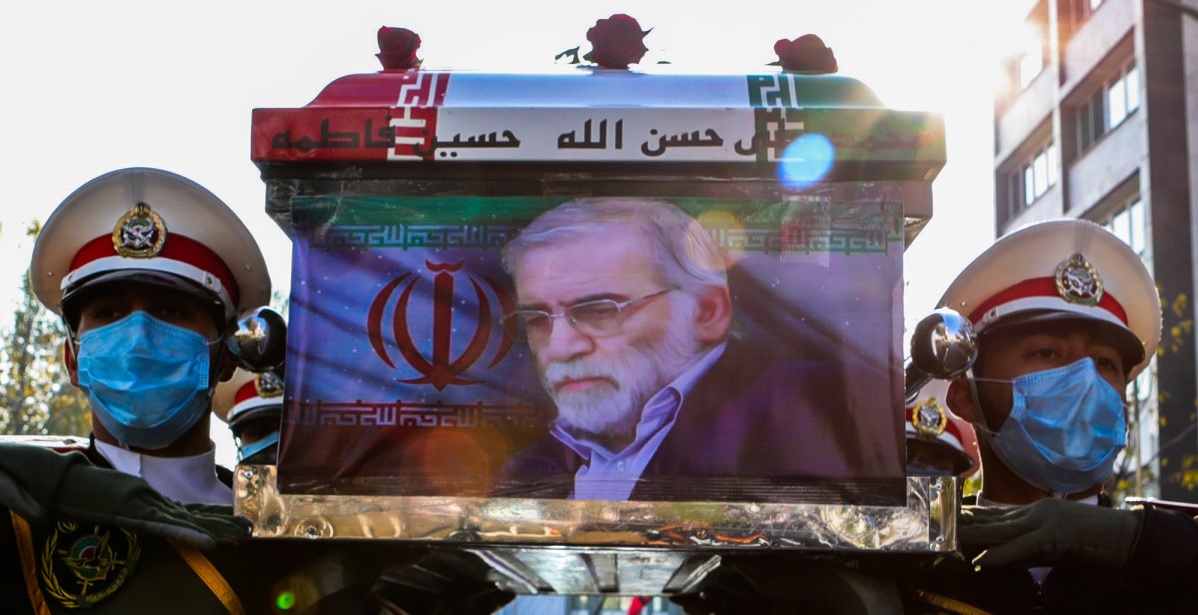Unknown to most Iranians until Friday, when he was assassinated, the nuclear scientist Mohsen Fakhrizadeh was well known to those who followed Iran’s nuclear program. Western security sources regarded him as instrumental. Yet it was observed that when he was attacked Fakhrizadeh was accompanied by several bodyguards, indicating how seriously Iran took his security.
The semi-official Fars News Agency said that, “The Iranian nuclear scientist was assassinated Friday east of Tehran was shot by a remote-controlled machine gun operating out of another car.” Iranian media downplayed Fakhrizadeh’s importance, introducing him as a scientist and researcher involved in the search for homegrown test kits for Covid-19″ in recent weeks.
Fakhrizadeh was traveling with his wife Friday in a bulletproof car, alongside three security personnel vehicles, when he heard what sounded like bullets hitting a vehicle, and he exited the car to determine what had happened. When he exited the vehicle, a remote-controlled machine gun opened fire from a Nissan stopped about 150 meters from Fakhrizadeh’s car as reported by the various local Iranian media. According to the media reporting’s by Fars News and The Semi-official Iranian Students News Agency (ISNA), “Fakhrizadeh was hit at least three times. His bodyguard was also shot. Following the gunfire, the Nissan exploded and the attack lasted for three minutes.”
Mark Fitzpatrick, an associate fellow with London’s International Institute for Strategic Studies (IISS) who follows Iran’s nuclear program closely, also tweeted: “Iran’s nuclear program is long past the point when it is dependent on a single individual. The motive for the assassination for which no one has claimed responsibility would appear to have been political, rather than relating to Iran’s nuclear activities.”
Two possible motives stand out: firstly, to jeopardize potential improvements in relations between Iran and the new Biden administration in the United States. And the other reason can be to encourage Iran to engage in a retaliatory act. With top Iranian officials blaming Israel, Supreme Leader Ayatollah Seyyed Ali Khamenei and others have promised revenge for the killing of Mohsen Fakhrizadeh, who was the country’s chief nuclear scientist.
Supreme Leader Khameini wrote Saturday on a Twitter account that often carries his official statements stating that, “Mr. Mohsen Fakhrizadeh was killed by the oppressive enemies.” Iranian President Hassan Rouhani while adding on the assassination said that “The enemies are experiencing stressful weeks,” he further added that, “They are mindful that the global situation is changing, and are trying to make the most of these days to create unstable conditions in the region. This rare scientific mind lost his life for his everlasting great scientific work. He lost his life for God and the supreme leader.”
When Mr. Rouhani refers to Iran’s “enemies”, he is evidently talking about the Trump administration, Israel and Saudi Arabia. Both Israel and Saudi Arabia are worried about the changing tide of politics in the Middle East and its consequences for them once President-elect Joe Biden takes office. President Hassan Rouhani, also among the many Iranian leaders blamed Israel, promised retaliation as well. President Rouhani while talking to media said, “The think tanks and the enemies of Iran must know that the Iranian nation and the officials in charge in the country are brave and determined to respond to the murder in time.”
Iranian Foreign Minister; Mohammad Javad Zarif called on the international community to end their shameful double standards and condemn this act of state terror. He said that, “the attack showed serious indications of Israeli role.” Iran has not yet provided any evidence of Israeli involvement. Israeli Prime Minister; Benjamin Netanyahu’s office declined the claims made by the Iranian government and officials.
Joe Biden made it clear during his election campaign that he wished to rejoin the Iran nuclear deal, which was negotiated by his predecessor Barack Obama in 2015 and forsaken and put to halt by the exiting President Donald Trump in 2018.
Israel and Saudi Arabia’s concerns about Iran were reportedly discussed at what Israeli media said was a secret meeting between Israeli Prime Minister Benjamin Netanyahu and Saudi Crown Prince Mohammad bin Salman in Neom last Sunday. Whereas, both the leaders have denied the news of any discussion that has took place between Benjamin Netanyahu and MBS. Mr. Netanyahu was reportedly also not successful in persuading the prince to normalize diplomatic relations between their two countries.
The reported Neom meeting was said to have been arranged by US Secretary of State Mike Pompeo, who had just been to Qatar and the United Arab Emirates (UAE), where Iran was the main topic of conversation.
The killing threatens to compound tensions in Tehran-Washington relations, which have deteriorated under US President Donald Trump. In 2018, Trump pulled out of a multilateral nuclear deal with Iran, and Iran began withdrawing its commitments from the 2015 Joint Comprehensive Plan of Action last year. Trump has invoked crippling economic sanctions on the country.
Students and young Iranians have converged on several government buildings in Tehran, and at one demonstration outside the Foreign Ministry on Saturday, protesters burned US and Israeli flags and posters depicting Trump and President-elect Joe Biden.
Indeed, many Iranians took the social media platform to have asked how, despite Iran’s rhetoric about its military and intelligence superiority, someone so well-guarded, sensitive and important to state could be assassinated in broad daylight? There are also concerns that the killing will be used as an excuse for further arrests inside the country.
While Israel is secure knowing that the US will remain committed to its security under President-Elect Mr. Joe Biden, it must be concerned that his nominee for secretary of state, Antony Blinken, is a staunch supporter of the Iran nuclear deal. Mr. Blinken’s the proposed secretary of state of the United State approach to the Middle East may also lead to more opportunities for the Palestinians. He was critical of Mr. Trump’s decision to move the US embassy in Israel from Tel Aviv to Jerusalem, although Mr. Biden has said he would not reverse it.

The author is doing M. Phil in Public Policy and Governance. He is working as a freelancer. Previously worked with HubPages and Washington Post.
